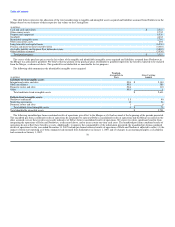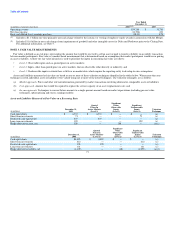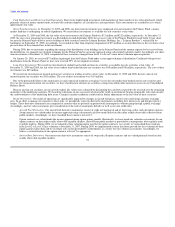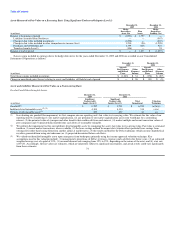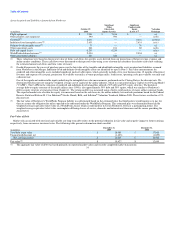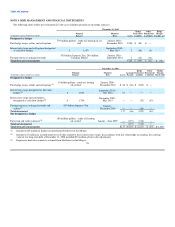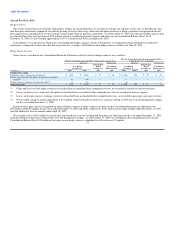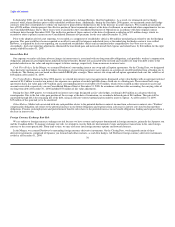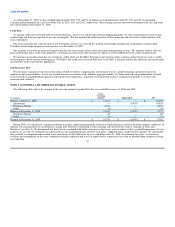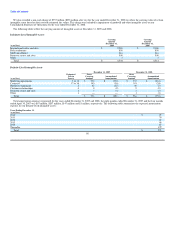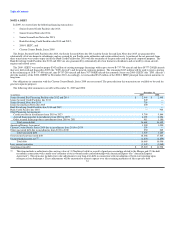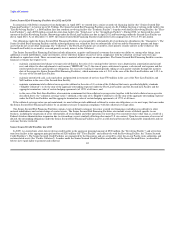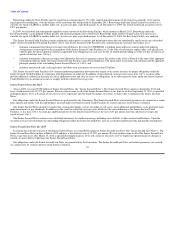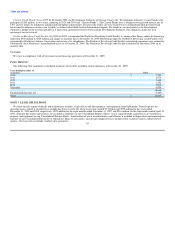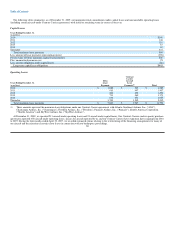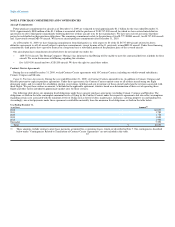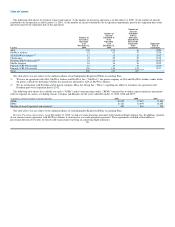Delta Airlines 2009 Annual Report Download - page 83
Download and view the complete annual report
Please find page 83 of the 2009 Delta Airlines annual report below. You can navigate through the pages in the report by either clicking on the pages listed below, or by using the keyword search tool below to find specific information within the annual report.
Table of Contents
In September 2008, one of our fuel hedge contract counterparties, Lehman Brothers, filed for bankruptcy. As a result, we terminated our fuel hedge
contracts with Lehman Brothers prior to their scheduled settlement dates. Additionally, during the December 2008 quarter, we terminated certain fuel hedge
contracts with other counterparties to reduce our exposure to projected fuel hedge losses due to the decrease in crude oil prices. We recorded an unrealized
loss of $324 million, which represents the effective portion of these terminated contracts at the date of settlement, in accumulated other comprehensive loss on
our Consolidated Balance Sheet. These losses were reclassified in the Consolidated Statements of Operations in accordance with their original contract
settlement dates through December 2009. The ineffective portion of these contracts at the date of settlement resulted in an $11 million charge, which we
recorded to other (expense) income on our Consolidated Statement of Operations for the year ended December 31, 2008.
Prior to the adoption of fresh start reporting, we recorded as a component of stockholders' deficit a $46 million unrealized gain related to our fuel hedging
program. This gain would have been recognized as an offset to aircraft fuel expense and related taxes as the underlying fuel hedge contracts were settled.
However, as required by fresh start reporting, our accumulated stockholders' deficit and accumulated other comprehensive loss were reset to zero.
Accordingly, fresh start reporting adjustments eliminated the unrealized gain and increased aircraft fuel expense and related taxes by $46 million for the eight
months ended December 31, 2007.
Interest Rate Risk
Our exposure to market risk from adverse changes in interest rates is associated with our long-term debt obligations, cash portfolio, workers' compensation
obligations and pension, postemployment and postretirement benefits. Market risk associated with our fixed and variable rate long-term debt relates to the
potential reduction in fair value and negative impact to future earnings, respectively, from an increase in interest rates.
Cash Flow Hedges. In the Merger, we assumed Northwest's outstanding interest rate swap and call option agreements. On the Closing Date, we designated
these derivative instruments as cash flow hedges for purposes of converting our interest rate exposure on a portion of our debt portfolio from a floating rate to
a fixed rate. The floating rates are based on three month LIBOR plus a margin. These interest rate swap and call option agreements had a net fair value loss of
$45 million at December 31, 2009.
Fair Value Hedges. During the June 2008 quarter, we entered into interest rate swap agreements designated as fair value hedges with an aggregate notional
amount of $1.0 billion to convert our interest rate exposure on a portion of our debt portfolio from a fixed rate to a floating rate. These interest rate swap
agreements had a fair value gain of $74 million and a corresponding interest receivable of $17 million, which were recorded in other noncurrent assets and
accounts receivable, respectively, on our Consolidated Balance Sheet at December 31, 2008. In accordance with fair value accounting, the carrying value of
our long-term debt at December 31, 2008 included $74 million of fair value adjustments.
During the June 2009 quarter, we terminated our interest rate swaps designated as fair value hedges, resulting in $65 million in cash proceeds from
counterparties. Due to the fair value gain position of these swaps at the date of termination, we recorded a deferred gain of $44 million. This gain will be
amortized through 2012, the remaining life of the debt, using an effective-interest method and recorded to interest expense. As of December 31, 2009,
$35 million of this gain had yet to be amortized.
Other Matters. Market risk associated with our cash portfolio relates to the potential decline in interest income from a decrease in interest rates. Workers'
compensation obligation risk relates to the potential increase in our future obligations and expenses from a decrease in interest rates used to discount these
obligations. Pension, postemployment and postretirement benefits risk relates to the potential increase in our benefit obligations, funding and expenses from a
decrease in interest rates.
Foreign Currency Exchange Rate Risk
We are subject to foreign currency exchange rate risk because we have revenue and expense denominated in foreign currencies, primarily the Japanese yen
and the Canadian dollar. To manage exchange rate risk, we attempt to execute both our international revenue and expense transactions in the same foreign
currency to the extent practicable. From time to time, we may also enter into foreign currency options and forward contracts.
In the Merger, we assumed Northwest's outstanding foreign currency derivative instruments. On the Closing Date, we designated certain of these
derivative instruments, comprised of Japanese yen forward and collar contracts, as cash flow hedges. All Northwest foreign currency derivative instruments
settled as of December 31, 2009. 78




